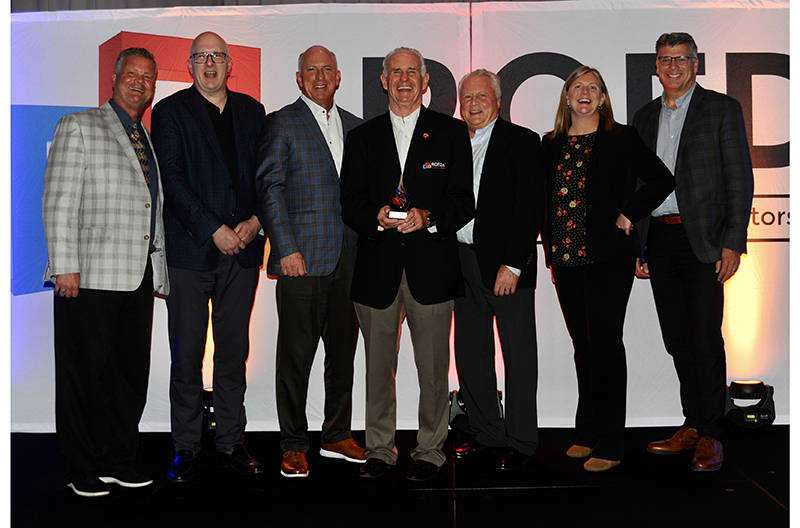Operating a business these days is no easy feat. And today’s business climate is even more difficult for independent grocers. Competition, supply chain challenges and tight budgets mean everyone involved in the grocery industry needs to bring their “A” game all the time.
Retailer Owned Food Distributors and Associates (ROFDA) is a national cooperative organization founded 60 years ago to address the needs of independent retail grocers.
ROFDA’s members comprise eight cooperative wholesalers, nearly 7,000 stores and more than 10,000 employees. Combined, they represent more than $35 billion in annual retail sales.
Since ROFDA was established as a co-op, annual profits are redistributed back to its members. The group also has vendor agreements in place with several partners that offer rebate or volume incentives that are redistributed to wholesale members.
An added benefit of ROFDA membership is the ability to aggregate this volume and take advantage of incentives that members most likely wouldn’t be able to claim on their own.
ROFDA’s board of directors includes some of the most influential people in the grocery industry: Randy Arceneaux, president and CEO, Affiliated Foods Inc.; Dan Funk, president and CEO, Associated Wholesale Grocers; Manard Lagasse Jr., president and CEO, Associated Grocers Inc.; Jerry McCann, president and CEO, Piggly Wiggly Alabama; Amy Niemetscheck, president and CEO, Certco; David Rice, president and CEO, Associated Food Stores (SLC); Ray Sprinkle, president and CEO, URM; and Michael Violette, president and CEO, Associated Grocers of New England.
Heart of ROFDA
Coining the phrase “co-opetition,” ROFDA encourages members to share ideas, resources and solutions to help level the playing field and create parity for today’s independent retailers.
Some of the ways it accomplishes this is by giving members exclusive access to tools, resources, industry best practices and the collective knowledge of its leaders and members.

“In many ways, independent retailers are more than just a grocery store. They are often the center of the communities in which they operate,” said Jeff Pedersen, president and CEO of ROFDA. “Independents are up against some formidable challenges, and ROFDA is here to help support their business so that they can successfully compete against stores of all sizes.”
The organization’s biannual conferences focus on sharing information.
“We feel it is important to always be bringing new ideas to the table, as well as building connections and facilitating collaboration that can help level the playing field for the independent retailer,” Pedersen said. “The meat of our conferences are getting together to learn from each other and see how we can move things forward, either as a group or individually.”
For Arceneaux, 2024 marks his 15th year on the ROFDA board. During this time, he’s seen his share of changes in the organization and how it has impacted his company.
“When I first got on the board, about 15 or 16 member warehouses were part of ROFDA. Today we are at eight member warehouses, but we are a more vibrant group that gets more accomplished than 15 years ago.”
Arceneaux said the one thing that has not changed is the ability to come together with a common goal in mind – to help independent grocers compete and thrive in the markets they serve.
“I feel the leadership we have in Jeff and the willingness of the CEOs, retailers and our multiple share groups that have evolved over the last seven to eight years have made us a much better organization working in the same direction,” he said.
Since its inception, working collaboratively has been ROFDA’s hallmark.
“It has always been important to us to provide a successful path to implementation for our members,” Funk said. “ROFDA has also worked to strengthen our partnerships and grow participation from product, service and program providers who gain intimate access to leaders within our membership to showcase new and innovative solutions to our membership.”
Gathering place
ROFDA’s conferences each spring and fall provide its wholesale, retail and associate members an opportunity to collaborate, both in large and smaller groups.
The organization continually reviews feedback and works to reshape its conferences to ensure the best value is always presented, according to Niemetscheck.

“Recognizing that associate members need to show an ROI for conference attendance, ROFDA has done a nice job at incorporating feedback to show associate members the value of being part of this group,” she said. “As the wholesalers continue to support bringing a variety of retailers, we have seen the associate members find a means to reach a group that was not directly available in the past.”
Niemetscheck added that ROFDA will also continue to create problem-solving share groups for the benefit of the independent grocer. Having associate members be a part of that solution should continue to show value.
“Conferences only happen if members continue seeing value in attending. We are greatly leaning in to ensure that happens,” she said.
Niemetscheck said another way ROFDA adds value is through best practice surveys. Wholesalers can share key performance indicators across several organizations.
“The data we can receive by being part of supply chain reports with our peers and competitors in an anonymous fashion – and the partnership that arises from the associate member who conducts the survey, and their feedback – has been a great benefit for us.”
Combined with the insight share groups provide, the surveys create extreme value for members.
“It always comes back to that alignment in our missions – and that being the independent grocer’s success,” Niemetscheck said. “When we lean in with that being the focus, it’s amazing the benefit ROFDA members continue to see.”
Key ROFDA initiatives
ROFDA is focused on adding value to its members and the independent retailers they support.

“A few key areas we are bringing together are new programs and services that we can collectively work on to help our companies and retailers succeed. Together, we have focused on strategic opportunities like Retail Media Network programs and areas of industry impacts like the Food Safety Modernization Act (FSMA 204),” Funk said.
[RELATED: Expert Explains Charting Path To FSMA 204 Compliance]
The act expands the requirements on traceability data-keeping for those who manufacture, process, pack or hold foods on the Food Traceability List. The FDA aims to have more streamlined processes in place to react to and track down potential contaminants.
Distributors must ensure they prepare and trace key data elements and critical tracking events. The compliance date is Jan. 20, 2026.
“Naturally, the FSMA 204 initiative is not a choice but a mandate, and the great thing about our ROFDA family is the ability to come together and work toward options that make sense for not only our member warehouses but also, more importantly, the retail members we all serve,” Arceneaux said.
Given that co-ops are owned by their members, the connection with each other to deal with these types of initiatives with good solutions is important.
“As the vendor community changes their go-to-market strategies and how the money is spent to accomplish their goals, we too must adapt and change to ensure our members are getting their fair share of the marketing monies available to not only drive business but also compete in the marketplace,” Arceneaux said.
“As a ROFDA family, many of us have come together and formed a Retail Media Network share group and worked to come together with solutions for this space.”

